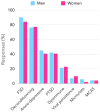Internal medicine at the crossroads of long COVID diagnosis and management
- PMID: 40385588
- PMCID: PMC12083770
- DOI: 10.3389/fmed.2025.1521472
Internal medicine at the crossroads of long COVID diagnosis and management
Abstract
The lack of specificity in its definition is a major obstacle to both explanatory and therapeutic research in long COVID. It brings together, on the one hand, patients with severe COVID-19 who suffer the classic complications of prolonged hospitalization and decompensation of comorbidities and, on the other hand, patients with non-severe acute COVID-19 who report multiple symptoms that cannot be fully explained by a biomechanical model. Indeed, despite numerous studies, it remains unclear how persistent viral infection, immunological or coagulation disturbances may contribute mechanistically to long COVID. Nevertheless, internal medicine should be in good place to manage these patients. Indeed, the diversity of symptoms may evoke a broad spectrum of differential diagnoses that are familiar to internists. Their experience in the exploration of unexplained symptoms is also valuable. It can reduce the need for multiple consultations with specialists and unnecessary laboratory or imaging tests. However, long COVID diagnosis cannot be limited to the exclusion of all other conditions one by one. An open and non-dualistic approach is required to identify other mechanisms that may explain the symptoms. Based on their clinical experience, most French internists who responded to an opinion survey consider that long COVID corresponds most closely to a functional somatic disorder (FSD) and seek the help of specialists in mental health care to assist in the management of the patients in a multi-disciplinary approach. However, as with other FSDs, patients with long COVID are usually reluctant to be managed by mental health care specialists, given the very physical nature of their presentation. Unfortunately, most physicians are in turn reluctant to take care of them, due to poor knowledge about FSD, leading to management failure. Alternatively, a comprehensive multidisciplinary care orchestrated by an experienced internist is generally well-accepted. It includes providing rational cognitive explanations for the symptoms and support for behavioral changes tailored to the patient. While waiting for hypothetical randomized controlled trials assessing drugs with positive results, such a holistic approach has been successfully applied in many individuals with severe long COVID. However, its generalization would require a much broader training for FSD of all health care providers.
Keywords: functional somatic disorder (FSD); holistic care; internal medicine; long COVID-19; post-acute COVID-19 syndrome.
Copyright © 2025 Ranque and Cogan.
Conflict of interest statement
The authors declare that the research was conducted in the absence of any commercial or financial relationships that could be construed as a potential conflict of interest.
Figures


Similar articles
-
Vesicoureteral Reflux.2024 Apr 30. In: StatPearls [Internet]. Treasure Island (FL): StatPearls Publishing; 2025 Jan–. 2024 Apr 30. In: StatPearls [Internet]. Treasure Island (FL): StatPearls Publishing; 2025 Jan–. PMID: 33085409 Free Books & Documents.
-
Florida Controlled Substance Prescribing.2022 Oct 26. In: StatPearls [Internet]. Treasure Island (FL): StatPearls Publishing; 2025 Jan–. 2022 Oct 26. In: StatPearls [Internet]. Treasure Island (FL): StatPearls Publishing; 2025 Jan–. PMID: 33428370 Free Books & Documents.
-
NP Safe Prescribing of Controlled Substances While Avoiding Drug Diversion.2023 Jan 29. In: StatPearls [Internet]. Treasure Island (FL): StatPearls Publishing; 2025 Jan–. 2023 Jan 29. In: StatPearls [Internet]. Treasure Island (FL): StatPearls Publishing; 2025 Jan–. PMID: 33232099 Free Books & Documents.
-
American Medical Society for Sports Medicine position statement: concussion in sport.Br J Sports Med. 2013 Jan;47(1):15-26. doi: 10.1136/bjsports-2012-091941. Br J Sports Med. 2013. PMID: 23243113 Review.
-
Behavioural modification interventions for medically unexplained symptoms in primary care: systematic reviews and economic evaluation.Health Technol Assess. 2020 Sep;24(46):1-490. doi: 10.3310/hta24460. Health Technol Assess. 2020. PMID: 32975190 Free PMC article.
References
Publication types
LinkOut - more resources
Full Text Sources

